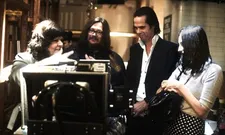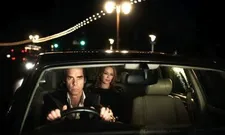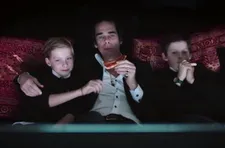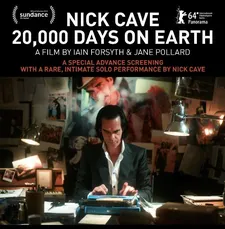20,000 Days On Earth loosely intertwines Nick Cave with music collaborators Kylie Minogue, Warren Ellis and Blixa Bargeld, submerging us into his unholy earthiness. Ray Winstone, Captain Stanley in John Hillcoat's The Proposition, written by Cave with an Ellis/Cave score, joins the cast of witnesses.
Speaking with Jane Pollard and Iain Forsyth in New York, we discussed the importance of Vladimir Nabokov’s Lolita, Nicolas Roeg's The Man Who Fell To Earth, Michel Gondry-like eels, the genesis of the project in an open Cave notebook and the fateful day of recording Push The Sky Away.
 |
| Jane Pollard and Iain Forsyth - Nick Cave with Susie Bick: "We hope at the end of the film you feel I should just bother to see my ideas through." |
The morning after a screening of 20,000 Days On Earth and performance by Nick Cave at Florence Gould Hall inside the French Institute Alliance Française, I met up with the directors at the Regency Hotel on Park Avenue for breakfast. Jane ordered poached eggs on toast – they arrived (the poached eggs) the moment we began to talk about anthropophagy.
Before we started our conversation on their film, I asked Jane and Iain to pass on greetings to Nick from an old friend.
Anne-Katrin Titze: When I first saw the title of your film, I thought of Jules Verne adventure stories Twenty Thousand Leagues Under The Sea or science fiction movies of the 1950s. How did you decide on this very unusual title for a film about a musician?
Jane Pollard: The title came from Nick. We found it in Nick’s notebooks – the notebooks he was using whilst he was writing Push the Sky Away. He had a song in there that was called something like 19,652 days on Earth and it was him approximating how many days he had already been on Earth.
Then he phoned up his PA and said “Can you work out how long I’ve actually been on Earth in days?” And then she said, but interestingly enough – because they were close to recording the album – “on the day you are going to record the album you will have been on Earth for 20,000 days”. So he had written this calculation. As soon as we saw it, we knew it was our title.
 |
| Nick Cave drives Kylie Minogue: "With Kylie there’s this lovely tenderness to their relationship." |
AKT: You don’t actually give the date of that day, do you?
JP: No we don’t. We just like that idea of that alternate measurement how long you’ve been alive. And it makes you think about how do we measure and mark the time that we’ve had around. What have we done with it, you know? The title also brought to mind not only Jules Verne but also The Man Who Fell To Earth. That title sounded really good.
AKT: Time is one of the big themes in the film. The other ones, I picked out, are memory, fear, and transformation. Those are the four cornerstones. How much were these your choices or your subject's?
JP: Nick never saw the whole picture. The big theme in the film is and was always about - and the film is this in itself – the idea of having a small idea and protecting it against all of the factors that might try to destroy it and keeping with it until you see it through. And the film was that. It was a small idea that we could make something bold and ambitious you haven’t seen before about a musician at the height of his creative achievement and still make that interesting. That was the idea we were protecting.
We hope at the end of the film you feel I should just bother to see my ideas through. In the interview, in the archive, and maybe through the drives as well we approach those themes of memory, of fear, of time passing, transformation. We’d come at them in each of the scenes. We weren't sure where they were going to play out. I think Nick probably had an idea about the questions he was being asked by the way that things were leading. The different people in the car. But we deliberately kept him away from the big structure.
 |
| Cavemen - Nick Cave with Arthur and Earl enjoying a 20,000 Days on Earth moment: "As a director you’re never really sure what your film is going to be." |
AKT: The people he interacts with on that fictional day are limited. How did these four collaborators of Nick's come into the picture?
Iain Forsyth: They were all people we thought would draw out a different side of Nick. Like all of us he is a multi-faceted person who is different under different circumstances.
AKT: What would examples of those different sides be?
IF: Well, the big interview with the psychoanalyst you see, with Darian Leader. He was someone who we knew would interrogate Nick in a sort of journalistic way without the complexities of being a journalist. Journalists tend to ask Nick the same questions for 30 odd years. They ask the same questions and he gives the same answers. So we wanted to find a different way to elicit responses from him. Because professionally he was a psychoanalyst we thought he’d have a different way to get under the skin.
AKT: They didn’t know each other?
IF: No. They didn’t meet until we were actually on the set and set the cameras up.
AKT: That’s interesting. One never really knows in your film. Please tell me more about the different facets the interactions brought out.
JP: With Kylie there’s this lovely tenderness to their relationship. And they do the same job. There is this spectrum, they’re at the different ends – one is truly alternative, the other is absolutely mainstream – at the heart we felt that there’s a shared experience.
AKT: And Blixa?
JP: And Blixa, they hadn’t talked for a long time. They didn’t have a good conversation about why he left [the Bad Seeds]. It was a risk. We didn’t know whether they’d be able to approach that topic well. We thought it was worth a try.
![On Nick Cave with Blixa Bargeld: "They hadn’t talked for a long time. They didn’t have a good conversation about why he left [the Bad Seeds]."](/images/newsite/Nick_Cave_with_Blixa_Bargeld_225.webp) |
| On Nick Cave with Blixa Bargeld: "They hadn’t talked for a long time. They didn’t have a good conversation about why he left [the Bad Seeds]." |
AKT: And Ray Winstone?
JP: With Ray, nobody gets away with anything. With Ray, there’s no poetry. He cuts through everything. There’s a lovely down to earthiness. The themes we were talking about, they’re quite big ideas. We needed to allow our audience breaks to give them moments that are funny, Nick and Ray’s relationship has a real flavor of that, normal and down to earth.
AKT: It also brings in the film collaborations. The other connections are through music.
JP: The two guys are about the same age, and are both facing dilemmas or questions about how you continue to do what you do and get older. What that means to your profession.
IF: I think for Ray it means being offered different parts. The roles that he is suited for are changing. And Nick as a musician is beginning to think about how the performances might change.
AKT: And Warren Ellis you chose because of the eels? Do you like eels?
JP: No.
IF: No.
JP: With Warren at the center of the film we needed a part where Nick wasn’t going to speak. We just wanted someone else to carry the scene and Warren is such an amazing storyteller. When Nick is with Warren, Warren does all the talking. We wanted to give the audience a break from hearing Nick.
AKT: You chose first person singular for the narration. Nick starts out saying “I wake. I write. I watch TV.” Was there ever another option? You always wanted it to be the I?
 |
| 20,000 Days on Earth poster: "He was the first musician to ask us to make a music video." |
JP: It had to be. You’re in his head. He is speaking directly to you.
AKT: The importance of Nabokov’s Lolita in his life surprised me. Did you know about this beforehand?
JP: I had heard him talk about his father reading him Lolita. We didn’t know that he would talk about it. That he would talk about seeing his father transform. Everything was improvised. We had no idea what he was going to say. That was all done in one take with no script. It’s a great way to work. As a director you’re never really sure what your film is going to be.
AKT: By coincidence, I have an interview scheduled later today with the directors of The Last Of Robin Hood about Errol Flynn’s last relationship. In their film they have a scene where Errol Flynn talks to Stanley Kubrick about possibly being cast in Lolita. How did you first encounter Nick Cave?
JP: He was the first musician to ask us to make a music video. Iain and I have been making contemporary art, video and sound installations for 21 years together.
AKT: Do you remember the first time you noticed him? Not necessarily in person but his work? As somebody who was on this Earth?
JP: For me it was Iain who made me a mixed tape when we first got together and there were a few Nick Cave songs in there.
IF: I guess when I was in school.
AKT: I noticed him first watching Wings of Desire (1987) by Wim Wenders.
IF: It must have been around the time The Good Son (1990) record came out, I guess. I remember being really blown away by how at odds it sat with how everyone else was making music at that time. It felt like a timeless and important record. Most records sounded very of their time and that record sounded ageless and had a poetic quality to it.
AKT: Anthropophagy sets the tone at the start of your film. Very daring to begin with cannibalism.
JP: Yeah, Nick wrote that.
AKT: And you put it at the start. Can you talk a bit about your structuring, your placement of the shocking, the poetic and the mundane?
IF: That idea that Nick talks about of being a "cannibal" - that life is cannibalised into song and into the world he is creating is a really important piece to understand that world. The brilliant thing about Nick as an artist is that he is writing generally about things that are true. They might be churned through a kind of imagination, through a creative mythological fantastical world. There is a real human truth. Getting these ideas out there early on is important.
AKT: You made an interesting segue from cannibalism to truth. Did I miss something?
JP: The cannibalism is only a metaphor.
AKT: Religion comes up but doesn't take center stage. It does so more in his songs. What was your decision making about religion?
JP: We could really only work with what Nick said. That's the beauty of riding that fine line between construction and reality, between fiction and documentary. Nothing in the film was scripted. Nothing Nick said was pre-planned. We were waiting for him to come back to earth.
At this point, as if right on cue, Nick saunters over towards our table.
AKT: Now I can tell you in person, greetings from [an old friend].
Nick Cave: Oooooh, Oh yeah!
Nick to Jane and Iain: How long have you been doing this [the interviews]?
IF: A while. How are you doing?
NC: Great. See you later.
JP: See you, love.
Nick, dressed in a colorful shirt and customary jacket, leaves as quickly as he came.
AKT: You end on a very green nightly lawn.
JP: The garden he is walking in is the garden opposite his house in Brighton. It's a great green.
20,000 Days On Earth will have its UK premiere on August 13 at Somerset House in London and will open in New York on September 17 and in LA on the 26.






















